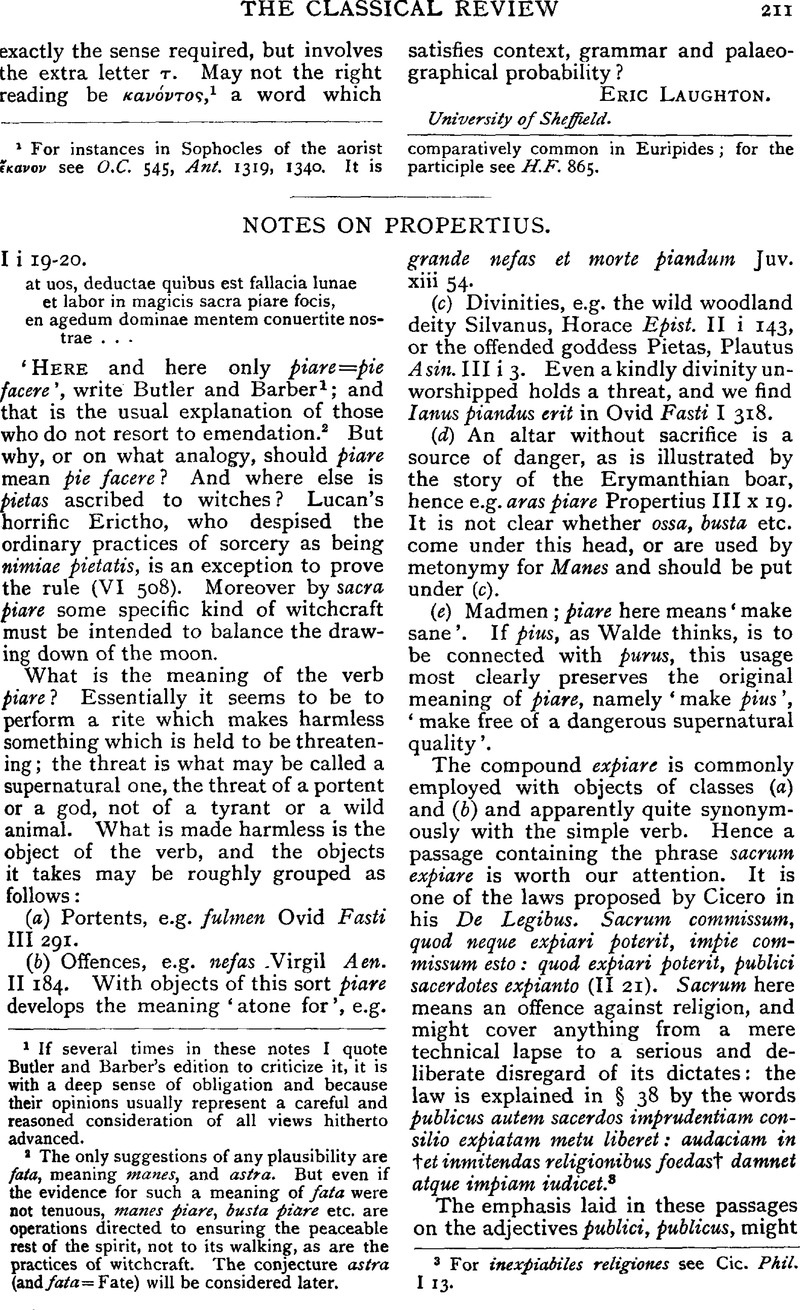Article contents
Notes on Propertius
Published online by Cambridge University Press: 27 October 2009
Abstract

- Type
- Review Article
- Information
- Copyright
- Copyright © The Classical Association 1938
References
page 211 note 1 If several times in these notes I quote Butler and Barber's edition to criticize it, it is with a deep sense of obligation and because their opinions usually represent a careful and reasoned consideration of all views hitherto advanced.
page 211 note 2 The only suggestions of any plausibility are fata, meaning manes, and astra. But even if the evidence for such a meaning of fata were not tenuous, manes piare, busta piare etc. are operations directed to ensuring the peaceable rest of the spirit, not to its walking, as are the practices of witchcraft. The conjecture astra (and fata=Fate) will be considered later.
page 211 note 3 For inexpiabiles religiones see Cic. Phil. I 13.
page 212 note 1 The only other example of this word (for which Lobeck proposed to substitute simpulatricem or simpuuiatricem) known to the dictionaries is Statius Theb. IV 551, where the priestess of Diana-Hecate is said to be qualis, si crimina demas, Colchis et Aeaeo simulatrix litore Circe. The dictionaries allege that Circe is called simulatrix because she turned her visitors into animals, which would seem rather to be a reason for calling the victims simulatores (compare Ovid's Morpheus Met. xi 634); and clearly this explanation does not suit the passage in Festus. A witch may be called simulatrix either on the theory that the feats of witchcraft are illusion (compare the view that the rope-trick depends on the hypnotism of the audience), that it produces, in the words of Heliodorus (III xvi 3), φαντασιας τν μ ντων ὡς ντων or more generally on the ground that the claims to power and knowledge are at least, partially unjustified— τοὺς μν δ μαγευτς πνυ οὐκ εἶναι προσκει πολλοὺςγρ πολλκις οἱ τοιοτοι, τἂ μν τινα ληθ, τ δ δ πλεω ψευδ λγοντες νεοχμον παρουσι(Dio CassiuS lii 36). Ovid makes Circe a producer of illusion —effigiem nullo cum, corpore falsi fingit apri (Met. xiv 358) and her halls are (according to the better-attested reading) uanarum plena feraruin (ibid. 11). Seneca's Medea, too, can think it time for aliquid fraude uulgari altius (693).
page 212 note 2 On this see further K. F. Smith in Hastings' Encyclopedia s.v. Magic (Greek and Roman), Hopfner in P.W. s.v. Mageia col. 382, and H. Hubert in Daremberg-Saglio s.v. Magia pp. 1499, 1501.
page 212 note 3 If piatio was a common practice among witches, further point is given to the threat of Canidia's victim in Horace's Epodes: dirisagam uos: dira detestatio nulla expiatur uictima.
It would be no offence against the Latin language or the facts of witchcraft if by sacra Propertius meant the witches' own rites, or, as Hertzberg suggested, properties. The relation between the witch and the divinity, says K. F. Smith (loc. cit.), ‘is abnormal and distinctly perilous: to get out of it safely is, therefore, quite as important as to get into it safely… above all the remains of a sacrifice… must be disposed of ceremonially… the more usual method was to eliminate them by burning them, burying them or throwing them into running water or sea’. The context, however, requires some activity which benefits not the witch but her client. Unger's emendation astra piare makes sense, for a witch might be employed to avert the threat of the stars revealed by astrology, but I hope I have shown it to be unnecessary. Also intelligible but unnecessary is fata piare in the obvious sense of the words; it could be supported by Philostratus Vit. Apoll. V. 12 γητες…μεταποιεῖν φασ τ εἱμαρμνα.
page 213 note 1 Compare Virgil's underworld, where Acheron, Cocytus, and Styx are connected.
page 213 note 2 The possibility cannot be excluded that a couplet has been lost beginning with et modo, to which et modo of line 3 corresponded. Even if that should be the case, the general interpretation of the passage is unaffected.
page 213 note 3 Unless by Phillimore, whose translation, ‘hallowed office’, is ambiguous. The bulk of my note was written before I had consulted Hertzberg's edition.
page 214 note 1 The most plausible cases are I iv 5 and II xxxii 10, but in neither is it necessary to assume postponement; even if one does, they are not true parallels, for quo magis and in nemus could not be split by the insertion of et.
page 215 note 1 Cf. I l l viii 19, where most MSS. have uersat, but uertas seems certain.
page 215 note 2 This may be why Housman wished to read continuis for nocturnis (Journ.Phil. 16. p. 10).Google ScholarHeimreich, (Quaestiones Propertianae p. 13) also felt that there was something wrong and heroically proposed the excision of 23–26.Google Scholar
- 1
- Cited by


